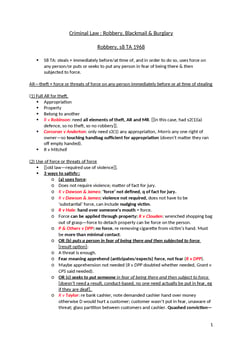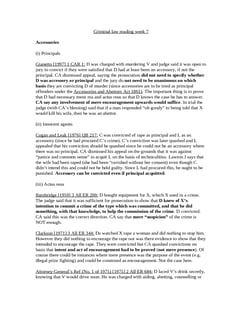Anderton v Ryan [1985] AC 560
Judgement for the case Anderton v Ryan
KEY POINTS
In cases involving criminal attempts and handling stolen goods, a key factor to consider is the defendant's belief regarding the status of the goods.
The presence of concrete evidence of theft may not always be required to establish whether a criminal attempt has occurred.
Relevant statutes, such as the Criminal Attempts Act of 1981, may govern the determination of criminal attempts and their legal framework. Under this Act, the criteria and conditions for establishing criminal attempts are outlined, providing a structured framework for legal assessments in cases involving criminal attempts, including those related to handling stolen goods.
FACTS
The defendant faced a charge of dishonestly attempting to handle a video cassette recorder, believing it to be stolen, under section 1(1) of the Criminal Attempts Act 1981. The prosecution presented evidence that the defendant had received the recorder, thinking it was stolen, but there was no confirmation that it had indeed been stolen.
The justices ruled that the defendant could not be convicted solely based on her belief that the recorder was stolen and dismissed the charge. However, the prosecutor appealed the decision. The case was brought before the Divisional Court of the Queen's Bench Division.
Subsequently, the defendant appealed to the decision of the Divisional Court.
JUDGEMENT
The appeal was allowed, except for Lord Edmund-Davies, who dissented.
The Court held that, following a careful examination of section 1 of the Criminal Attempts Act 1981, specifically subsection (3), it became evident that a defendant could not have been convicted of attempting to commit an offense when, irrespective of their belief, the intended completed act could not, based on the facts, constitute a criminal offense.
Since it had to be assumed that the video recorder had not been stolen, and the defendant's intended actions could not have amounted to a criminal offense, she could not have been found guilty of attempting to handle stolen goods.
COMMENTARY
This case explores the complexities of criminal attempts and handling stolen goods. It highlights the significance of a defendant's belief, often central in such cases, and emphasizes that concrete evidence of theft isn't always required to establish a criminal attempt.
The case involved a defendant charged with attempting to handle a video cassette recorder, believing it to be stolen under the Act. The prosecution presented evidence of the defendant's belief but couldn't confirm theft. Initially, the justices ruled against conviction, asserting a belief in theft alone wasn't enough.
Upon the prosecutor's appeal, the case reached the Divisional Court of the Queen's Bench Division, and the defendant also appealed.
The appeal succeeded, except for a dissenting opinion. The Court held that, after reviewing the Act, it was clear that a conviction for an attempt couldn't stand when the intended act, irrespective of the defendant's belief, couldn't, based on the facts, constitute a criminal offense. This was due to the assumption that the recorder wasn't stolen and the defendant's actions weren't criminal.
ORIGINAL ANALYSIS
Defendant attempted to handle a good that she believed was stolen. In fact it had not been stolen and there was no evidence to suggest this.
HL said that S.1 did not allow for conviction where, on the true facts of the case, there could not have been a crime, whatever Defendant’s beliefs.
Lord Bridge
Said that in objectively looking at the facts (i.e. forgetting what Defendant believed) there was a perfectly proper commercial transaction.
If S.1 is to be taken as creating criminalisation where no offence has been committed then a man who takes his own umbrella from a stand, believing it to be someone else’s, or a man who has sex with a 16 year old when he thought she was 15 would be guilty.
Lord Bridge also argued that S.1 has not allowed for criminalisation without any guilty act but merely an incomplete guilty act. To allow criminalisation where the intended crime is impossible would be to make a guilty mind alone liable.
RELATED CASES
For Further Study on Anderton v Ryan
Need instant answers? Our AI exam tutor is here to help.
Ask questions 🙋 Get answers 📔 It's simple 👁️👄👁️
Our AI is educated by the highest scoring students across all subjects and schools. Join hundreds of your peers today.
Get StartedRelated Product Samples
These product samples contain the same concepts we cover in this case.
| GDL Criminal Law | Inchoate Offences Notes (13 pages) |
| Criminal Law | Inchoate Offences Notes (23 pages) |
| GDL Criminal Law | Theft Related Offences Notes (11 pages) |


